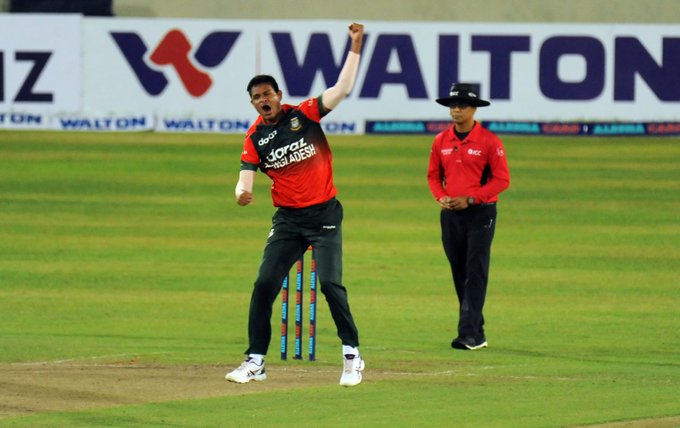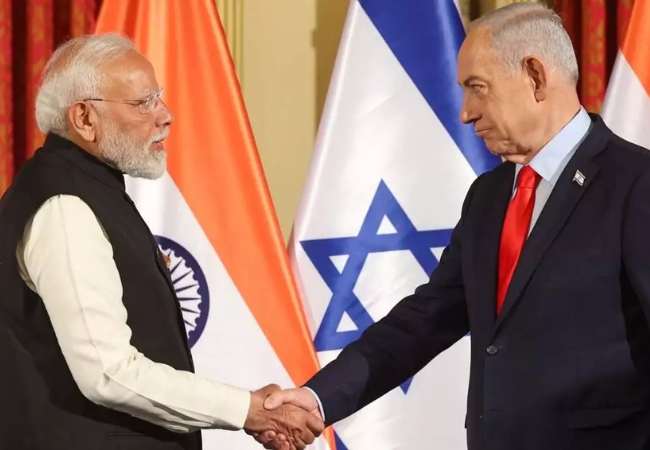Dhaka, Aug 3: Left-arm spinner Nasum Ahmed claimed a career-best 4-19 as Bangladesh successfully defended a moderate 131-7 and beat Australia by 23 runs in the first of their five Twenty20s on Tuesday.
Australia was bowled out for 108 in 20 overs, it's lowest total against Bangladesh in the shortest format.
Left-arm pacers Mustafizur Rahman and Shoriful Islam took two wickets apiece to complement Nasum and secure Bangladesh's first victory against Australia in five encounters.
Failing to deal with the spinners cost Australia.
Shakib Al Hasan, another left-arm spinner, and offspinner Mahedi Hasan also played their part, taking a wicket each.
Mitchell Marsh, who struck three half-centuries in five matches against the West Indies, was the only Australian to sustain any resistance. He made a run-a-ball 45 before being sixth man out.
The combination of Nasum, Shakib and Mahedi reduced Australia to 11-3 in the third over.
Mahedi broke through with the first ball to dismiss Alex Carey, Nasum got Josh Philippe stumped for 9, and Shakib accounted for Moises Henriques before Marsh got going.
With Shakib and Mahedi denying Australia a flow of runs, Nasum ripped through the middle order in a gem of spin bowling.
Marsh kept the visitors' hopes alive with calculated aggression, and his confidence grew after hitting Shakib for six. Marsh was undone in Nasum's last over when he went for a slog-sweep, and Australia's chances effectively went with him.
Made to bat first, Shakib top-scored for Bangladesh with 36 off 33, and opener Mohammad Naim struck a 29-ball 30, clobbering two fours and as many sixes. Afif Hossain added an unbeaten 23 off 16.
Naim flicked Australia speedster Mitchell Starc for a six over midwicket with a cracking shot in the second ball of the innings.
Starc's new ball partner, Josh Hazlewood, broke through with the wicket of Soumya Sarkar on 2, and Naim was removed by legspinner Adam Zampa.
Shakib and captain Mahmudullah played with caution but failed to rotate the scoreboard rapidly.
Hazlewood (3-24) broke the partnership, dismissing Mahmudullah for 20 with a knuckle ball.
Hazlewood also took the crucial wicket of Shakib when he appeared set to pace the scoreboard.
Starc got a couple of tailenders but Afif Hossain held up one end to help the side go past 130.
The second match is on Wednesday.
Let the Truth be known. If you read VB and like VB, please be a VB Supporter and Help us deliver the Truth to one and all.
Srinagar (PTI): National Conference MP Aga Ruhullah Mehdi on Monday criticised Jammu and Kashmir Chief Minister Omar Abdullah for failing to "condemn" the assassination of Iranian Supreme leader Ayatollah Ali Khamenei.
Mehdi said if Abdullah cannot find the courage to condemn the assassination of Khamenei, his words of concern for the situation in the Gulf country have no value for the people who followed and respected the Supreme leader of Iran.
"While going through Tweets and statements, I found that he is "concerned" and falls short of condemnation, let alone a word of tribute," Mehdi said in a post on X without naming the chief minister.
The Lok Sabha member from Srinagar constituency, who is in an estranged relationship with the ruling National Conference, said if Abdullah does not have the courage to condemn the act of aggression against a sovereign nation, he should keep his concern to himself.
"If you cannot find the courage to condemn an act of aggression against a sovereign nation and assassination of a highly respected religious figure who is widely followed by your electorate and fellow citizens, because the people in power in the centre you are trying to cosy up to will get upset- Keep your "concern" with yourself," Mehdi added.
The chief minister on Sunday said he was deeply concerned about the unfolding developments in Iran, including the killing of Iran's Supreme Leader, Ayatollah Ali Khamenei.
"I appeal to all communities to remain calm, uphold peace, and avoid any actions that could lead to tension or unrest," he posted on X.
National Conference issued a statement attributed to party president Farooq Abdullah in which he condemned the killing of Khamenei in joint strikes by the US and Israel.
"(Farooq) Abdullah has strongly denounced the act, describing it as a tragic and destabilising development with serious implications for peace and stability in the region," the National Conference said in the statement.
While going through Tweets and statements I found that he is “concerned” and falls short of condemnation let alone a word of tribute.
— Aga Syed Ruhullah Mehdi (@RuhullahMehdi) March 1, 2026
If you cannot find courage to condemn an act of aggression against a sovereign nation and assassination of a highly respected religious figure…


_vb_08.jpeg)


